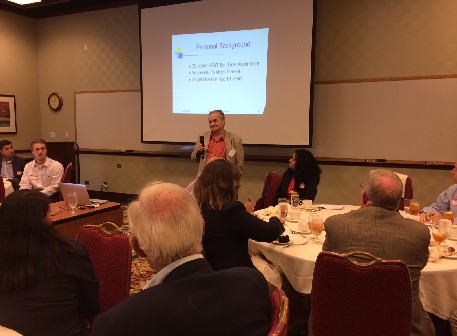Successful NJ Angel John Ason Tells All at NJEN September Meeting

John Ason, the New Jersey-based angel investor who has had some spectacular exits — including from Diapers.com (Montclair), Xlibris (Bloomington, Indiana) and LiveLOOK (Matawan) — provided a glimpse into the mindset of a tech angel investor at the Sept. 17 New Jersey Entrepreneurial Network meeting.
Angels are typically the first professionals to invest in a company, after the founders have exhausted family and friends. Ason said his round is usually about $600,000.
He noted that angels are very private people. There is no list of angels equivalent to the lists of VCs. “Most of us are retired professionals.”
Ason acquired his technology background at AT&T, where he spent 25 years. He’s been investing in startups for 18 years, funding 60 enterprises. Right now he has 22 active companies in his portfolio.
If you want to approach Ason to fund your company, there is only one way to do it. Send a one-page executive summary, he tells startup executives.
And make sure it’s not ten pages crammed into one. He wants to see something that’s easy to read, even attractive, on one page that will put him at ease and relax him.
He said that when he chooses to finance a company, he wants to have a pleasant experience. Angels, he said, “like the excitement of growing a company. We want an environment where we can contribute, and the biggest thing we provide is contacts.”
“We invest in people, not the idea. We want to see market validations, do you have customers or potential customers,” he added.
In terms of investment returns, Angels need to see ten times their investment in three to five years. The reason they need so much money on the upside is that most investments fail, so the one that doesn’t fail has to take up the slack for the others.
Some 60 percent of the companies Ason invests in go belly-up, he said, and some 30 percent become “lifestyle businesses.” With lifestyle businesses, there is just enough money left for the founder to keep the lights on, but nothing left for the investor. This is the worst outcome for the angel investor, said Ason, which is why he puts a clause in his contracts saying that “after five years, we can sell to the founder for the original price plus some interest.”
Ason warned that negotiating with Angels is an asymmetrical process. Angels have the advantage because they’ve done many deals before and “you’ve done none,” or perhaps one or two. They know what they need in a contract to be sure they’ll earn enough money to make their investment worthwhile. “If someone is going to take advantage of you, walk away, it’s not the deal for you,” he advised.
Don’t forget, he added, Angels can walk away from an investment at any time, and they often do.
After a company has its first meeting with an angel, the angel will be looking for certain characteristics to be sure the company will be an ongoing concern.
One of these is quick decision making.
“We want to see you execute first, and it’s important for me to see you make decisions quickly. When you need to change something, we don’t want you to take six weeks or three months to figure out what you need to do. If you can’t make a decision very quickly, you can’t be a startup. Time is the most expensive thing you have.”
Entrepreneurs shouldn’t try to do everything in-house. “We want to see you outsource everything, except for your core competency. If you are a great programmer, but you need an accounting program, don’t build it. There is a lot of free software and a lot of cheap software, and you can buy it. The more you do outside of your company, the faster you can grow,” he said.
Ason likes to see companies that have leverage and margins of 70 to 80 percent. With margins like that, you can make a mistake and still compete, he noted. If you are starting with a 50 percent margin and you make mistakes, you can’t survive, he said.
Ason also encourages his companies to compete and cooperate with big competitors. As he comes from a large-company background, he had some unique insights to offer his audience.
“I like to ask a startup who their main strategic competitors are, the people who can blow them out of the water,” he said, and then I tell the startup to sell to them or to tell the bigger company their idea.
“The reason is the following: They can’t possibly compete with you. Their cost of doing business is too high (about 10 to 20 times your cost of doing business). They have legacy systems, they need sign-offs, they have to fit this innovation within their budget cycle … It will take them three to five times as long to develop a product to compete with yours. They are afraid of you.”
They won’t steal your idea, Ason said, presenting a scenario of a big company with 100 little “rat” startup companies nipping at its heals.
“If you are rat #73, it’s unlikely that they will stop [what they are doing] in order to crush you. No VP ever got promoted for crushing rat #73.”
Will the big company steal your idea? The answer is no, he said. Large companies reject thousands of ideas every year.
“It’s part of their DNA,” he said. A big company that has something in the works similar to your idea will cancel their R&D. If they really want your idea, they will find that it is cheaper to buy your company than to develop the idea themselves, he concluded.

